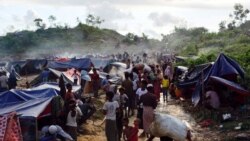News headlines ● In annual address, U.S. President Trump touts economy ● International Criminal Court team begins mapping out probe of atrocities against Rohingyas ● EU states urge justice in Myanmar at UN Security Council ● Coronavirus death toll 500 ● World Health Organization declines to call coronavirus a global epidemic Shortwave, 31-meter band 9310 kHz 25-meter band, 11570 kHz, 12030 kHz Bridge … Report: Mohammed Rukon Uddin (stringer) Topic: Treating mental illness among refugees. Summary: Many Rohingyas have been exposed to bullying, torture and violence, which can harm their mental health. Suchona Borua Gipsy strives to help them as a health counselor for Ganashastha Kendra, a health organization with operations in Cox’s Bazar. She counsels patients with physical and mental ailments, and also has a volunteer outreach team go door to door to identify people with needs. If patients need more intensive care, they’re referred to a psychiatrist. “When they come to us and share their problems, then they feel better,” Gipsy says. Forced displacement contributes to poor health, she adds. [A 2018 UNHCR report supports her observation. It notes Rohingyas have been caught up in a humanitarian crisis for years, with most displaced from their homes in Myanmar’s Rakhine state. Many are crowded into Bangladesh refugee camps, where risk factors include exposure to potentially traumatic events, poverty, food shortages, violence and statelessness. But they also have protective factors, including religion and social supports.] “Family has to take the biggest responsibility to support the patient,” Gipsy says. But “sometimes, patients don’t have a family member. … Therefore, society also nees to support the patient.” 2-way report: Hussain in Washington with Mohammed Idris Abdullah (stringer) Topic: A young man talks about volunteering on the Danish Refugee Council protection efforts in Kutupalong Camp 7. Translation summary: Mohammed Hasan came to the camp with his mother after fleeing Khainda Para village in Myanmar’s Maungdaw township in late August 2017. He volunteered with the council’s protection unit for nearly two years ending in Dec. 31 Interviewed at his home in Camp 7, Hasan said he and a handful of others, including two women, looked out for especially vulnerable people among the camp’s 40,000 residents. They connected seriously ill people with health care, at-risk elderly with needed services, women entrepreneurs with sewing machines, and needy people with everything from mosquito nets to dishes to emergency food rations. Hasan said he and the others lost their positions with the council, where he had earned 800 takas or $9.42 a day. He hopes the Bangladesh government will permit refugees to do paid work.
খন্ড
-
![]() ডিসেম্বর ১৯, ২০২৫
ডিসেম্বর ১৯, ২০২৫Rohingya Broadcast
-
![]() ডিসেম্বর ১৮, ২০২৫
ডিসেম্বর ১৮, ২০২৫Rohingya Broadcast
-
![]() ডিসেম্বর ১৭, ২০২৫
ডিসেম্বর ১৭, ২০২৫Rohingya Broadcast
-
![]() ডিসেম্বর ১৬, ২০২৫
ডিসেম্বর ১৬, ২০২৫Rohingya Broadcast
-
![]() ডিসেম্বর ১৫, ২০২৫
ডিসেম্বর ১৫, ২০২৫Rohingya Broadcast
-
![]() ডিসেম্বর ১২, ২০২৫
ডিসেম্বর ১২, ২০২৫Rohingya Broadcast







